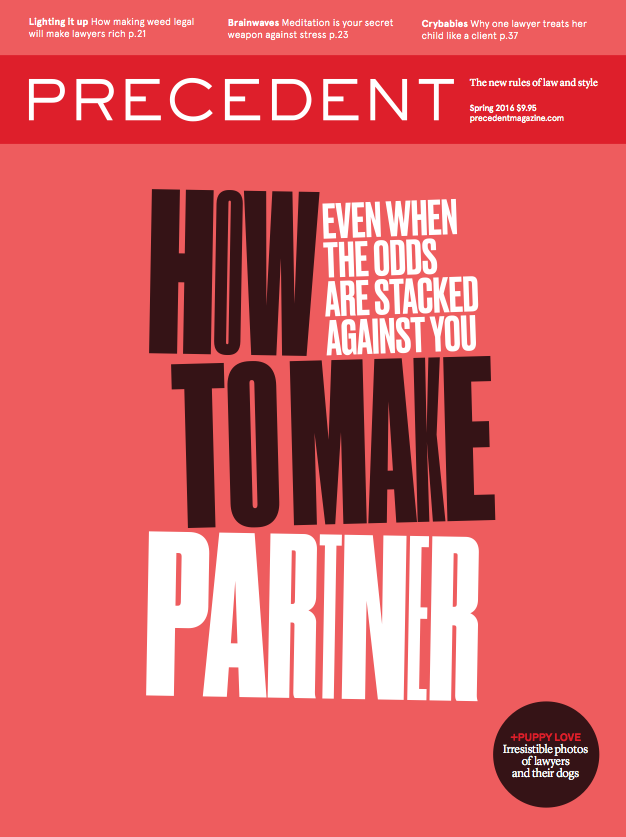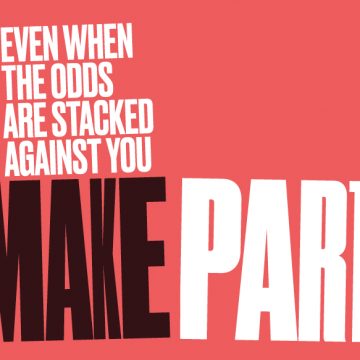1. Sell yourself
“It’s not enough to do good work,” says Sarah Armstrong, who became an equity partner at Fasken Martineau DuMoulin LLP in 2013, 10 years into her career — a breakneck ascent, considering she took two maternity leaves in that time. “You need people to know you do good work.”
Such advice has particular relevance for associates looking to advance at a big firm. After all, when partners have a big file, they bring top associates into the fold — or, more accurately, associates they think are the best. And getting on those files leads to billable hours and contact with clients, two prerequisites for partnership.
Luckily, self-promotion doesn’t have to be shameless. “I would speak at firm-wide events to market myself to the partners,” says Armstrong. “I once presented on arbitration clauses to corporate partners.” Sure enough, a partner asked her to draft one, which led to more work down the line. “It only happens when you put yourself out there.”
2. Quit the cocktail parties
Jill Daley didn’t just make partner quickly — she made partner early. In 2014, as a sixth-year lawyer, Daley became a partner at Norton Rose Fulbright LLP, one year before associates are supposed to become eligible for partnership. And yet, Daley, a leading pharmaceutical lawyer, never goes to networking events.

“I meet with clients all the time. But I take them to lunch and sit in their boardrooms.”— Jill Daley, Norton Rose Fulbright LLP
This shouldn’t be a surprise. A recent study on rainmaking, published by the U.S. consultancy firm Lawyer Metrics, found that most bona fide rainmakers don’t fish for clients at cocktail parties. In fact, many rainmakers are introverts who dislike attending them. “It surprises me how often people tell lawyers to go to parties,” says Monique Drake, who co-authored the study. “That’s not how most lawyers get clients.”
Meanwhile, rainmaking is more important than ever. “Ten years ago, there was so much work,” says Armstrong. “If associates survived long enough, they would make partner. That’s not really the case anymore.” In today’s weak economy and increasingly competitive market, they can only make partner if they have a knack for getting clients.
So, if not at cocktail parties, where do clients come from? “I don’t want to sound patronizing,” says Daley, “but most new business comes from doing good work for existing clients.” This helps in two ways. One, clients often move companies, where they hire the lawyer they liked the best. Two, clients send referrals to their favourite associates. Indeed, this is how Daley built a client roster.
But what, then, do rainmakers do to impress clients?
To start, they often learn the minutiae of each client’s world, says Drake. “They know what’s important to each client’s business and the internal politics each client faces.” And they learn this, simply, by listening. “Let’s say a rainmaker has to file a motion.
So she calls the client, but the client is upset about something else. Most lawyers try to steer the conversation back to the matter at hand. The rainmaker, though, will find out what’s going on.”
Deep client knowledge, in turn, tends to make lawyers more comfortable with risk — another hallmark of rainmakers. “Lawyers sometimes say to clients, ‘On one hand, we could file this motion, but we only have a 60 percent chance of winning. So what do you want to do?’” explains Drake. But rainmakers don’t waffle: they know how much risk a client can tolerate.

“Clients won’t come back to you if, whenever they have a problem, they feel like they’ve inconvenienced you.”— Anthony Spadaro, Davies Ward Phillips & Vineberg LLP
“By couching advice in all sorts of back and forth, you’re effectively leaving it to the client to decide,” says Jason Mangano, who made equity partner at Blaney McMurtry LLP last year, as a ninth-year lawyer, about as fast as was possible. “But remember: clients come to you for recommendations and those recommendations need to be clear.” That’s not to say junior lawyers should launch headlong into categorical advice. “This is for senior associates,” says Drake, “who’ve been plugged into a client’s world for years.”
Does this mean cocktail parties are a waste of time? Not necessarily. Having personal relationships with clients is important. So if a client will be at an event, it might make sense to attend. Mangano surely thinks so. “Going to parties over the years has really paid off,” he says. But Daley’s clients never go to networking events. Associates eyeing partnership, then, should look for ways to spend time with clients — at parties, or somewhere else entirely. “I meet with clients all the time,” says Daley. “But I take them to lunch and sit in their boardrooms. I visit them where they are.”
3. Stay calm
Bay Street lawyers face an unending stream of shitstorms: the deadlines are intense and clients often call with Friday-afternoon emergencies. But top associates always keep their cool.
“Clients won’t come back to you if, whenever they have a problem, they feel like they’ve inconvenienced you,” says Anthony Spadaro, a 2009-call at Davies Ward Phillips & Vineberg LLP, who made non-equity partner in 2014, lockstep with the firm’s partnership track. “You have to roll with the punches.”
 This story is part our series on making partner, from our Spring 2016 issue.
This story is part our series on making partner, from our Spring 2016 issue.


